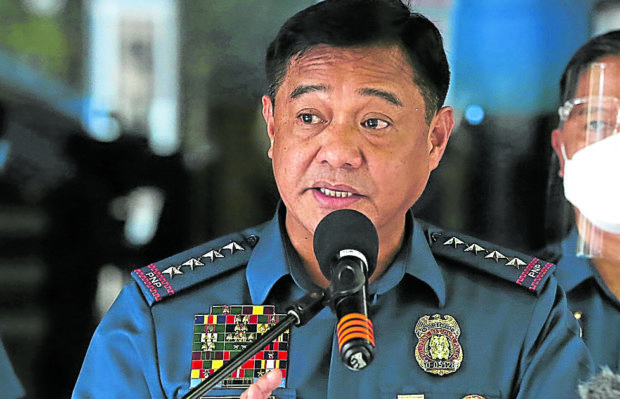BAGUIO CITY, Benguet, Philippines — Gen. Camilo Pancratius Cascolan, who will be retiring next month as Philippine National Police chief, used to be a militant student in high school here in the early 1980s, but the years he spent at the Philippine Military Academy (PMA) drove him to a different direction.
A Baguio native, Cascolan returned on Monday to turn over 200 assault firearms to the city police’s Special Weapons and Tactics team.“I was an activist from 1981 to 1982. I may have conducted ‘lightning’ rallies on Session Road,” he told a crowd of government employees during their flag-raising ceremony at City Hall.
He said he joined Kabataang Makabayan and the League of Filipino Students, both radical left-leaning groups, during his high school years at the University of the Philippines Baguio, where he graduated in 1981.
He attended first year high school at Saint Louis University and spent grade school with his siblings at Maryknoll Convent School.
“We were young. We attended skit nights against the government then. But when I entered (the PMA in 1982 as a member of “Sinagtala” Class of 1986), all that changed,” he said.
“The main reason I entered the PMA was maybe my parents thought I would not be able to finish school,” Cascolan said, quickly adding that “I can attest that life is difficult when you do not complete your basic education.”
Cascolan belongs to a family of civil servants. His sister, Celia Brillantes, is the assistant city health officer and three other sisters are employed at the Office of the Presidential Adviser on the Peace Process, the Overseas Workers’ Welfare Administration and the Department of Agriculture.
His brother and namesake, Camilo Jr., works at the Bureau of Customs. Another sister is a lawyer while the sixth sister is a nurse.
Their father built a career with the Social Security System while their mother spent most of her years at the city health services office to become the city pharmacist.
In his speech, Cascolan said he was confronting morale issues in his three-month stint as PNP chief up to his retirement on Nov. 10, as well as the impact of the coronavirus pandemic on uniformed personnel.He said he was setting a policy that would allow police officers to be assigned near or at their homes “so they can serve the community where they grew up.”
—Vincent Cabreza



